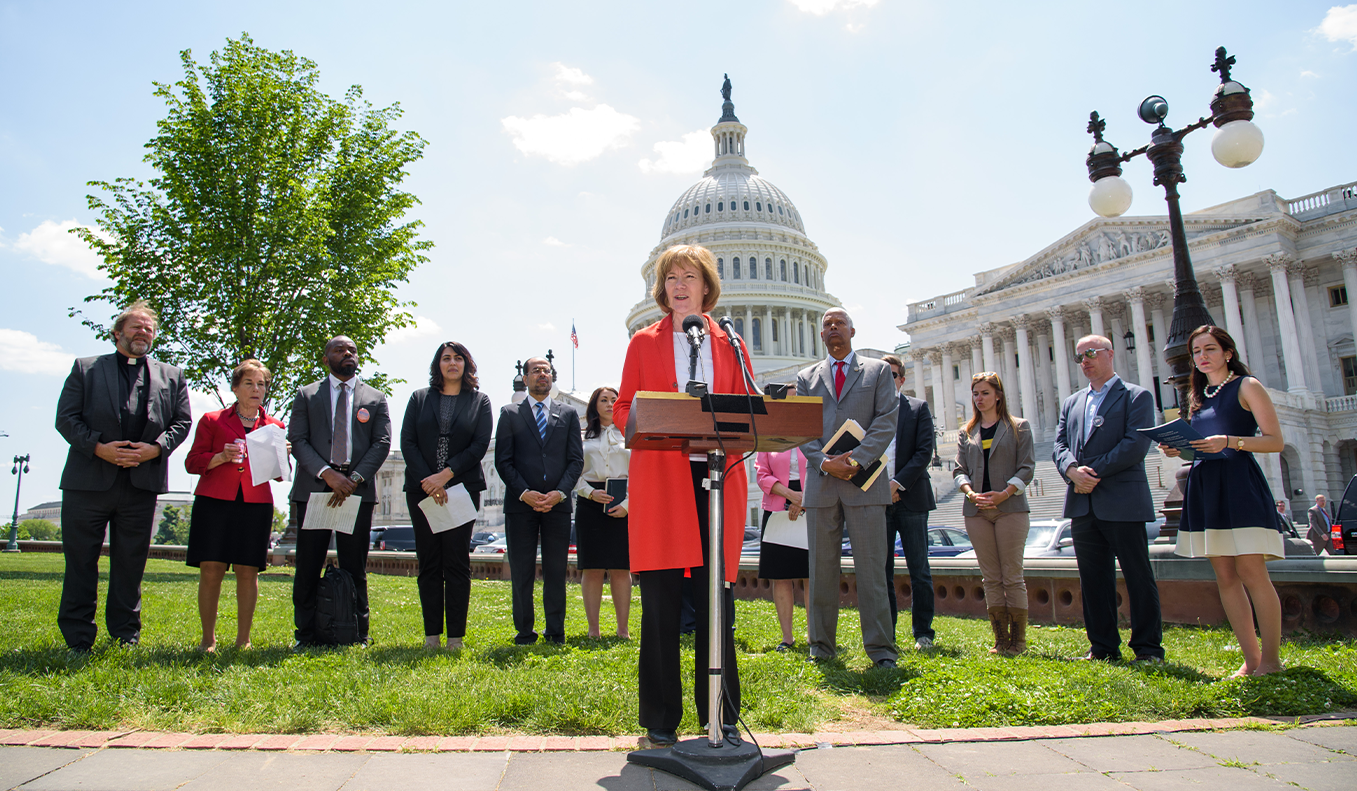Latest Newsletters
Working for Minnesota in Washington
I am lucky to represent you in Washington D.C. and to work every day in the United States Senate to make progress for Minnesotans. I’ll be honest, this can be a frustrating and divisive place. But it’s knowing that every win we have is for the people of Minnesota that continues to inspire me. These past months have been busy––but I am excited to give you an update on the work I’ve been doing in Washington. Working for a Cleaner Future I am working to advance a Clean Electricity Standard (CES) as part of the major budget package now being debated in Washington, D.C., building on my 2019 bill that would eliminate all net greenhouse gas emissions in the power sector. We have a climate crisis threatening our economy and our security; but choosing a clean energy future––done well––can provide cheaper energy, improve health, and create more jobs, opportunity and fairness in our economy. My plan, which would move electric power generation to net-zero carbon emissions, is a powerful and achievable tool to get us there. It would require utility providers to include more clean energy in their mix over time. This plan will allow every utility and region to start where it is and build from there. A CES is a great start as we address the climate crisis and can put America on a rapid path to net-zero electricity emissions. It’s not one-size fits all and it does not promote one kind of clean energy over another. Best
Traveling Across Minnesota
August was a jam-packed month, and during the Senate’s annual August recess, I was able to travel to communities across the state and hear from Minnesotans about issues that matter to them most. These visits help inform my work in Washington, D.C. and will be valuable as the Senate returns this month to finish work on transformative budget legislation that will not only address the continuing economic fallout from the pandemic, but also rebuild our nation’s crumbling infrastructure, create jobs, cut taxes, lower costs for Minnesota working families, and address the urgent threat of climate change. Important Minnesota Events During August Recess I began the August recess by chairing a Senate subcommittee field hearing in Minneapolis to examine Minnesota’s current and future transit needs in both rural and urban communities across our state. I heard from transit leaders from around Minnesota, as well as the nation’s top transit official, Nuria Fernandez of the Federal Transit Administration, who also joined me in riding the local light rail and touring local transit sites. Throughout August, I held conversations on my efforts to make child care available and affordable to working Minnesota families, and on my work to expand broadband networks in communities that currently are not connected. I visited River’s Edge Hospital and Clinic in St. Peter with Senator Klobuchar and U.S. Agriculture Secretary Tom Vilsack to discuss the importance of rural healthcare access. These issues will be top priorities for me in the upcoming Senate budget negotiations. Visiting schools including North Community High
Notes From The Capital: December 2018
Hello, On the last day of 2018, I’m thinking about the past year, and all that’s happened. People tend to use two phrases to describe what this year has been like for me: “whirlwind” and “hit the ground running.” The whirlwind was showing up in Washington almost exactly a year ago to meet with my new colleagues and staff, have dinner with Al and Franni, and, amazingly, find a place to live in an hour and a half. The whirlwind was the hundreds of meetings with Minnesotans—there were times when I fit 17 different meetings into one day. The whirlwind was going to dozens and dozens of
Notes From The Capital: January 2019
Fighting To Secure Back Pay for Low- and Mid- Level Federal Contract Workers I’m glad that President Trump’s 35-day shutdown—the longest in U.S. history—is over. A shutdown isn’t good for anyone. That’s why, in December, Senate Republicans and Democrats came together on a reasonable deal that would’ve kept the government open. But the President rejected it. This unnecessary and wasteful shutdown made pawns of hundreds of thousands of Americans. Among those hit the hardest are low- and mid- level federal contract workers, like janitors, cafeteria workers, and security guards. They aren’t getting back pay after this shutdown, and haven’t received back pay
Notes From The Capital: February 2019
Fighting to Extend Humanitarian Protections for Liberians in Minnesota Starting in the late 1980s, Liberia went through one of the bloodiest civil wars in Africa’s modern history, forcing thousands to flee the country. Many of them came to Minnesota. We’re now home to one of the largest Liberian-American communities in the country, some 30,000 people strong. Minnesota is their home. Unfortunately, the Deferred Enforced Departure (DED), a program that’s allowed many of these Liberians to live legally in the United States for decades, is set to expire on March 31. These neighbors do important work—especially in health care. They pay
Notes From The Capital: March 2019
Securing Humanitarian Protections for Liberians In the face of violence in Liberia, thousands of people came to the United States—many to Minnesota. Thanks to a humanitarian program (known as DED), they have been able to live legally in the United States. These are individuals with amazing resilience, fortitude and courage to uproot their lives in order to escape violence and come here. I’m relieved to see that today the President extended DED status for Liberians, which was set to expire at the end of the month. I’ve been relentlessly urging the President to extend these protections—Liberians are our neighbors, our
